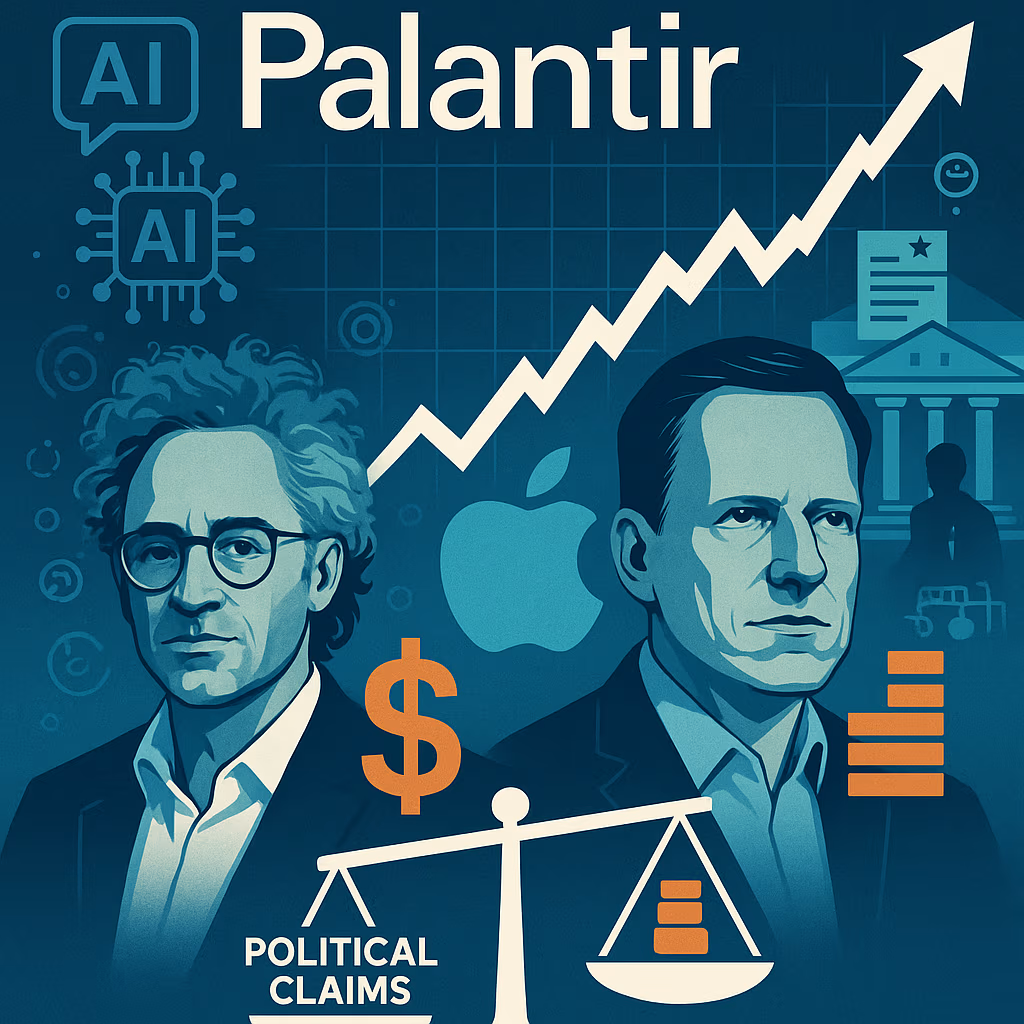Palantir Technologies has staged one of the most remarkable rallies in recent tech market history. Once seen as a controversial and enigmatic player in big data and defense analytics, the company is now a stock market standout. In just over a year, Palantir’s share price has more than tripled, fueled by optimism around artificial intelligence, government contracts, and long-term profitability. But beyond the company’s growth story lies another narrative: the stunning increase in personal wealth among its top executives.
From co-founder and CEO Alex Karp to billionaire investor and board member Peter Thiel, the monster rally in Palantir’s stock has generated billions in paper gains. Let’s dive into the numbers behind this surge—and explore what it means for the company, its leadership, and investors.
Palantir’s Stock Performance: From Underdog to Wall Street Darling
In early 2023, Palantir’s stock was hovering around $7, weighed down by skepticism over its profitability, limited commercial growth, and a heavy reliance on government contracts. But that narrative began to shift dramatically.
By mid-2024, Palantir’s stock had surged past $25 per share, marking a more than 250% increase in just 18 months. The company’s market capitalization now exceeds $55 billion, vaulting it into the ranks of top-tier AI-related firms. This dramatic rally has been driven by several key factors:
- Explosive AI optimism: Palantir’s embrace of artificial intelligence and its proprietary AI platform (AIP) attracted significant investor attention as the tech sector rallied around AI capabilities.
- Consistent earnings surprises: The company posted multiple consecutive profitable quarters—something Wall Street had long waited for.
- Surging demand from governments and enterprises: Palantir expanded beyond defense contracts and began winning new deals in health care, finance, and energy sectors.
- Retail investor enthusiasm: The company gained a strong following among retail investors who view Palantir as a long-term AI powerhouse.
This potent combination helped transform Palantir from a speculative stock to a legitimate growth play in the eyes of many investors.
Billionaire Paydays: The Executive Windfall
The soaring stock price didn’t just benefit shareholders—it delivered massive wealth gains for Palantir’s leadership team. At the center of this financial windfall is Alex Karp, the company’s CEO and public face.
According to the company’s most recent filings and insider ownership data:
- Alex Karp owns over 100 million shares and options, giving him a stake now worth more than $2.5 billion.
- Peter Thiel, who helped co-found Palantir and still holds a large equity position, has seen the value of his holdings climb to over $3.7 billion.
- Other top executives, including COO Shyam Sankar and CFO David Glazer, have also seen tens of millions in personal net worth appreciation through stock awards and performance-based incentives.
For Karp, this rally marks a dramatic transformation from controversial CEO to tech billionaire. His eccentric persona—complete with ski jackets in boardrooms and outspoken critiques of Silicon Valley—has made him a media fascination. Now, it’s also made him one of the most financially successful executives in the AI boom.
Stock-Based Compensation and Investor Reactions
Palantir has long relied on generous stock-based compensation to attract and retain talent. In earlier years, critics saw this as a weakness, citing shareholder dilution and questioning whether executives were overpaid for a company not yet turning a profit.
But with the recent rally, that conversation has flipped. Investors now view Palantir’s early equity grants as savvy bets—especially as the company’s fundamentals improve. Still, some institutional investors remain wary, especially about future dilution and whether incentive structures align with long-term shareholder value.
The company has responded by slowing its pace of new equity issuance and tying future awards more tightly to financial performance. For now, the rally has kept concerns in check—but continued scrutiny is likely if volatility returns.
AI Platform Growth: The Catalyst Behind the Rally
At the center of Palantir’s growth story is AIP—Artificial Intelligence Platform—a suite of tools that enables clients to build and deploy AI models in secure, highly regulated environments.
Unlike other tech firms that sell general-purpose AI APIs, Palantir’s approach is tailored to government, defense, and mission-critical enterprise applications. That niche—combined with its reputation for secrecy and national security work—has positioned the company as an AI provider with unmatched reach into government corridors.
In the past year, Palantir signed contracts with several major organizations, including:
- U.S. Department of Defense
- British NHS (National Health Service)
- Fortune 500 firms in oil & gas, insurance, and logistics
These wins not only boost revenue, but they also validate Palantir’s strategy to bridge AI and operational decision-making. Investors are betting that Palantir will be a critical infrastructure provider for AI deployment at scale—especially in high-stakes domains.
The Peter Thiel Effect
Another layer to Palantir’s mystique—and investor excitement—is the involvement of Peter Thiel. The billionaire venture capitalist, PayPal co-founder, and political influencer remains deeply connected to Palantir’s long-term vision.
Thiel’s vocal defense of Palantir’s defense work and his belief in “techno-patriotism” have shaped the company’s philosophy: one that is more aligned with government missions than Silicon Valley’s consumer-first ethos.
His long-term support of Palantir, including during years of sluggish stock performance, has also reassured loyal investors. As the company’s value surges, Thiel’s multi-billion-dollar stake further underscores his strategic foresight—and reaffirms his influence on the broader AI investment landscape.
Risks Still Linger
Despite its monumental rally, Palantir is not without risks. Critics continue to highlight several potential challenges:
- Valuation concerns: At current levels, Palantir trades at a high multiple of earnings and revenue, making it vulnerable to market pullbacks or earnings misses.
- Dependence on government contracts: While commercial revenue is growing, the company still derives a large portion of its income from a relatively narrow group of federal clients.
- Public perception and ethical scrutiny: Palantir’s work in surveillance, defense, and law enforcement continues to draw criticism from privacy advocates and civil liberty groups.
Moreover, if AI hype cools or newer competitors emerge with more agile platforms, Palantir could face pressure to justify its current valuation.
More Than a Rally
Palantir’s monster stock rally is more than a story of numbers—it’s a case study in how vision, narrative, and timing converge in the modern tech market. What began as a secretive government contractor is now seen as a pillar of applied artificial intelligence, with billions in market gains and newly minted billionaires at the helm.
For investors, the lesson is clear: in the age of AI, the companies that can turn technological complexity into scalable, defensible platforms are likely to be the biggest winners. And few have done that better—so far—than Palantir.
Whether the company can maintain its momentum remains to be seen. But one thing is certain: the stunning wealth generated for its executives and shareholders has already cemented Palantir’s place in this chapter of tech market history.





